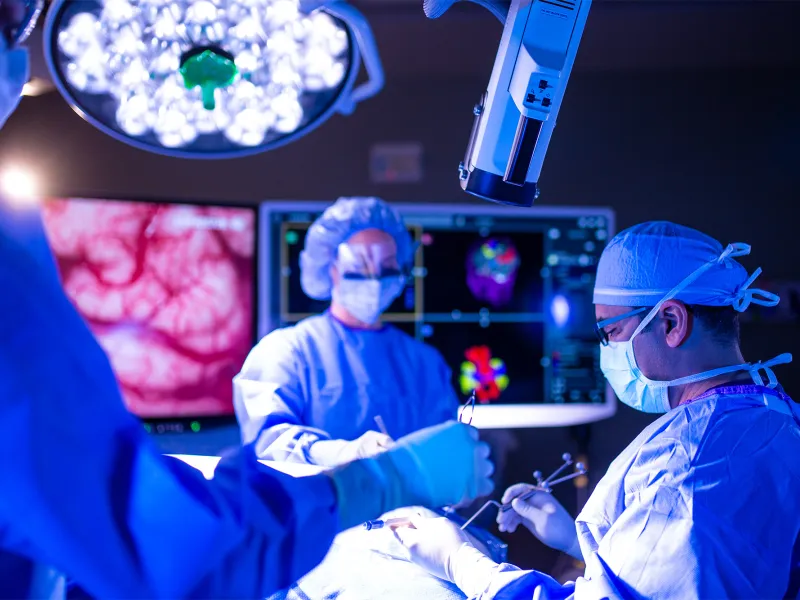
Innovative and Compassionate Care
Whether you’ve been diagnosed with brain cancer or a benign brain tumor, the prospect of brain surgery and treatment can feel overwhelming. Rest easier knowing you’re in good hands with our skilled and caring team in our Brain Tumor Program.
Here, you’ll be treated by specialists who are leaders in brain tumor care and have access to next-generation surgical tools. But since we know that feeling whole is about more than healing your body — and that you’re more than your condition — our care extends beyond physical treatment.
From early detection to advanced treatment and rehabilitation, we’ll guide you and your family through every stage of treatment and recovery, ensuring you have all the support you need to heal in body, mind and spirit.
Leading-Edge Brain Tumor Treatment
New technology and surgery techniques mean you have more treatment options than ever before. And our leading-edge technology is used by some of the country’s top specialists in Brain and Spine and neurosurgery. From the first signs of a brain tumor to treatment and recovery, we’ll be by your side.
- Intraoperative MRI
-
Interoperative MRI technology is important to us because it’s important for you. Since it gives us a better picture of your brain and tumor during surgery, we can see your tumor in real time, giving us a better chance at removing the entire tumor without damaging nearby tissue.
- Minimally Invasive Brain Surgery (MIBS)
-
Minimally invasive surgical techniques lower your risk of complication compared to traditional, open procedures. And, since these treatments require minimal or no incisions, you’ll have less pain and scarring and a faster recovery.
Depending on the specifics of your condition, our specialists may consider different minimally invasive surgery options, including:
- Brain port surgery
- Endoscopic brain surgery
- Endoscopic endonasal skull-base surgery
- Endoscopic microvascular decompression
- Neuroendovascular surgery
- Laser interstitial thermal therapy (LITT)
- Radiation and Chemotherapy
-
Radiation and chemotherapy are often used as primary treatments for certain cancers. But when it comes to treating brain tumors, there’s a bit more to determining whether these treatments might work for you.
Radiation
This therapy won’t remove the tumor, but it can shrink and eliminate cancer cells. So, if brain tumor surgery can’t remove the tumor entirely, radiation therapy may be a good option.
Chemotherapy
This traditional approach may be used as a follow-up treatment to surgery or radiation therapy and is especially helpful if you have slow-growing tumors or tumors that return after treatment.
We’ll work closely with you and your family to create a treatment plan that considers all the best options for helping you meet your health goals and achieve the best outcomes.
- Synaptive BrightMatter™
-
If you need complex brain tumor surgery, you can rest easier knowing that our team has access to advanced technologies like Synaptive Medical Inc.’s BrightMatter™ system. This leading-edge surgery system with a Modus V robotic digital microscope allows your neurosurgeon to better visualize and navigate complex procedures with wider, clearer and more targeted pictures of the brain.
Brain Tumors and Related Conditions We Treat
No matter your diagnosis, you’ll be in expert hands here at the AdventHealth Brain and Spine Institute. Our team has dedicated experience in diagnosing and treating a full range of brain tumor types and related conditions.
- Adenoid Cystic Carcinoma (ACC)
- Astrocytoma
- Atypical Teratoid Rhabdoid Tumors (ATRTs)
- Brain Stem Tumor
- Carcinomatous Meningitis
- Central Nervous System (CNS) Lymphoma
- Central Neurocytoma
- Cerebellopontine Angle Tumors (CPA)
- Cholesteatoma
- Chondroma
- Chondrosarcoma
- Choroid Plexus Carcinoma
- Choroid Plexus Papilloma
- Cushing’s Disease
- Dermoid and Epidermoid Tumors
- Dysembryoplastic Neuroepithelial Tumors (DNETs)
- Encephalocele
- Ependymoma
- Esthesioneuroblastoma or Olfactory Neuroblastoma
- Fibroma
- Fibrous Dysplasia
- Foramen Magnum Tumors
- Ganglioglioma
- Geniculate Neuralgia
- Germ Cell Tumors
- Giant Cell Astrocytoma
- Glioblastoma
- Gliosarcoma
- Glomus Tumors and Paragangliomas
- Granular Cell Tumors
- Growth Hormone Tumors (Acromegaly)
- Hemangioblastoma
- Hemangiopericytoma
- Hypothalamic Hamartoma
- Inflammatory Pseudotumor
- Inverting Papilloma
- Jugular Foramen Tumors
- Juvenile Pilocytic Astrocytoma (JPA)
- Medulloblastoma
- Meningioma Brain Tumor
- Meningocele
- Metastatic Brain Tumor
- Nasopharyngeal Carcinoma
- Neurofibroma
- Null Cell Adenoma
- Oligoastrocytoma
- Oligodendroglioma
- Orbital Tumors
- Osteomas
- Paranasal Sinus Tumors
- Pinealoma
- Pineal Cyst
- Pineal Parenchymal Tumors (PPTs) of Intermediate Differentiation
- Pineal Region Tumors
- Pineoblastoma
- Pineocytoma
- Pituicytoma
- Pituitary Tumor/Adenoma (Micro and Macro)
- Pituitary Apoplexy
- Pleomorphic Xanthoastrocytoma (PXA)
- Posterior Fossa Tumor
- Primitive Neuroectodermal Tumors (PNETs)
- Rathke’s Cleft Cyst
- Schwannomas/Neurilemmomas
- Sellar/Parasellar Tumors
- Solitary Fibrous Tumor
- Spindle Cell Oncocytoma
- Subependymoma
- Subependymal Giant Cell Astrocytoma (SGA)
- Teratoma
- Thyrotropinoma (TSHoma)

Experts Who Stay by Your Side
Our specialists understand how life-changing a brain tumor diagnosis can be, which is why they’ll support you through every treatment step. By combining compassionate care and leading-edge technology, we’ll put you on a path toward whole-person health and recovery.
A Team Dedicated to Whole-Person Recovery
Your healing journey doesn’t end with treatment, and neither does our support. A world-class team of physical, occupational and speech therapists is here to help you build strength, improve cognitive skills and master everyday tasks. Through each new challenge and triumph, we’re here for you and your loved ones, dedicated to your whole recovery.
